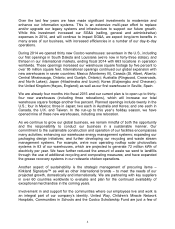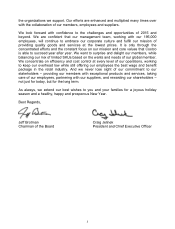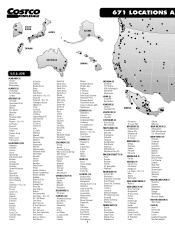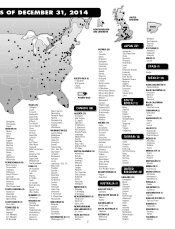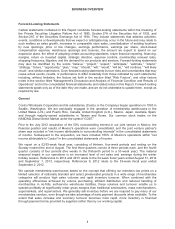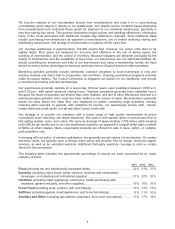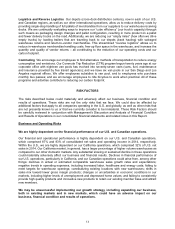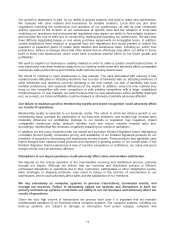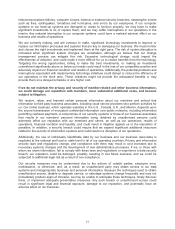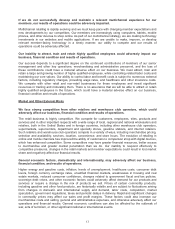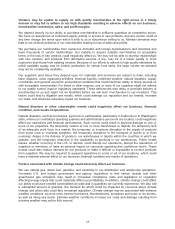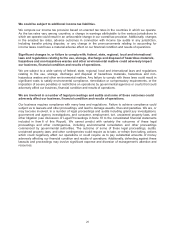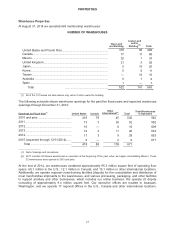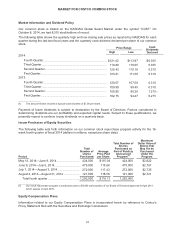Costco 2014 Annual Report Download - page 16
Download and view the complete annual report
Please find page 16 of the 2014 Costco annual report below. You can navigate through the pages in the report by either clicking on the pages listed below, or by using the keyword search tool below to find specific information within the annual report.Our growth is dependent, in part, on our ability to acquire property and build or lease new warehouses.
We compete with other retailers and businesses for suitable locations. Local land use and other
regulations restricting the construction and operation of our warehouses, as well as local community
actions opposed to the location of our warehouses at specific sites and the adoption of local laws
restricting our operations and environmental regulations may impact our ability to find suitable locations,
and increase the cost of sites and of constructing, leasing and operating our warehouses. We also may
have difficulty negotiating leases or real estate purchase agreements on acceptable terms. In addition,
certain jurisdictions have enacted or proposed laws and regulations that would prevent or restrict the
operation or expansion plans of certain large retailers and warehouse clubs, including us, within their
jurisdictions. Failure to manage these and other similar factors effectively may affect our ability to timely
build or lease new warehouses, which could have a material adverse effect on our future growth and
profitability.
We seek to expand our business in existing markets in order to attain a greater overall market share. A
new warehouse may draw members away from our existing warehouses and adversely affect comparable
warehouse sales performance and member traffic at those existing warehouses.
We intend to continue to open warehouses in new markets. The risks associated with entering a new
market include difficulties in attracting members due to a lack of familiarity with us, attracting members of
other wholesale club operators currently operating in the new market, our lack of familiarity with local
member preferences, and seasonal differences in the market. In addition, entry into new markets may
bring us into competition with new competitors or with existing competitors with a large, established
market presence. In new markets, we cannot ensure that our new warehouses will be profitably deployed
and, as a result, our future profitability could be delayed or otherwise materially adversely affected.
Our failure to maintain positive membership loyalty and brand recognition could adversely affect
our results of operations.
Membership loyalty is essential to our business model. The extent to which we achieve growth in our
membership base, increase the penetration of our executive members, and sustain high renewal rates
materially influences our profitability. Damage to our brands or reputation may negatively impact
comparable warehouse sales, diminish member trust, and reduce member renewal rates and,
accordingly, membership fee revenues, negatively impacting our results of operations.
In addition, we sell many products under our owned and exclusive Kirkland Signature brand. Maintaining
consistent product quality, competitive pricing, and availability of our Kirkland Signature products for our
members is essential to developing and maintaining member loyalty. These products also generally carry
higher margins than national brand products and represent a growing portion of our overall sales. If the
Kirkland Signature brand experiences a loss of member acceptance or confidence, our sales and gross
margin results could be adversely affected.
Disruptions in our depot operations could adversely affect sales and member satisfaction.
We depend on the orderly operation of the merchandise receiving and distribution process, primarily
through our depots. Although we believe that our receiving and distribution process is efficient,
unforeseen disruptions in operations due to fires, hurricanes, earthquakes or other catastrophic events,
labor shortages or shipping problems, may result in delays in the delivery of merchandise to our
warehouses, which could adversely affect sales and the satisfaction of our members.
We rely extensively on computer systems to process transactions, summarize results, and
manage our business. Failure to adequately update our systems and disruptions in both our
primary and back-up systems could harm our ability to run our business and adversely affect our
results of operations.
Given the very high volume of transactions we process each year it is important that we maintain
uninterrupted operation of our business-critical computer systems. Our computer systems, including our
back-up systems, are subject to damage or interruption from power outages, computer and
14


